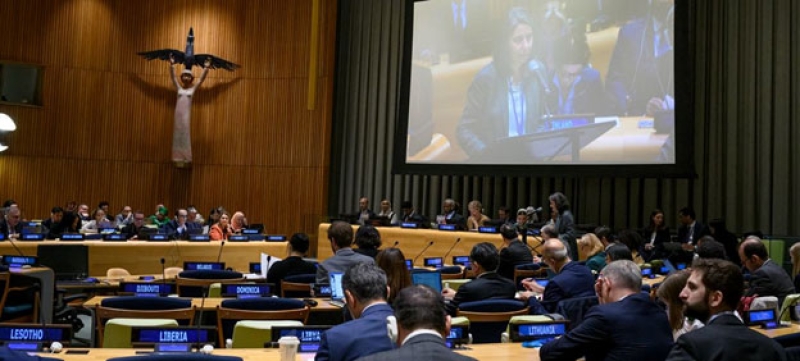- Israel Strikes Tehran with US Support Amid Nuclear Tensions |
- India Sees 9% Drop in Foreign Tourists as Bangladesh Visits Plunge |
- Dhaka Urges Restraint in Pakistan-Afghan War |
- Guterres Urges Action on Safe Migration Pact |
- OpenAI Raises $110B in Amazon-Led Funding |
US Pressures UN Members Over Two-State Peace Meeting

Delegates prepare for high-level UN conference. New York, May 2025. Credit: UN Photo/Loey Felipe
The United States, a longstanding and staunch ally of Israel, is threatening UN member states, urging them to avoid an upcoming high-level meeting aimed at recognizing a two-state solution to the Israeli-Palestinian conflict.
The meeting, co-chaired by France (a permanent member of the UN Security Council) and Saudi Arabia (a close political ally of the US), is scheduled for June 17–20.
According to The Guardian, the Trump administration is discouraging governments worldwide from attending the conference.
A diplomatic demarche sent last week states that countries taking “anti-Israel actions” following the conference will be viewed as acting against US foreign policy interests and may face diplomatic consequences from Washington.
“The United States opposes the implied support of the conference for potential actions including boycotts and sanctions on Israel, as well as other punitive measures,” the cable read.
The US also opposes “any steps that would unilaterally recognize a conjectural Palestinian state, which adds significant legal and political obstacles to the eventual resolution of the conflict and could coerce Israel during a war, thereby supporting its enemies,” according to a cable cited by The Jerusalem Post.
Sarah Leah Whitson, Executive Director of Democracy for the Arab World Now (DAWN) and former director of the Middle East and North Africa division at Human Rights Watch, told IPS that the international community should reject the Trump administration’s blatant intimidation intended to deter participation in a conference on Palestinian statehood.
She said the international community has a legal and moral duty to help end Israel’s illegal occupation and apartheid rule.
“The United States finds itself more and more isolated from the rest of the world because of its destructive obeisance to Israeli diktat,” Whitson declared.
“It is absolutely essential to keep alive the two-state solution perspective with all the terrible things we are witnessing in Gaza and the West Bank,” UN Secretary-General António Guterres told reporters last week.
“And for those who doubt the two-state solution, I ask: What is the alternative? Is it a one-state solution in which either the Palestinians are expelled or forced to live on their land without rights?”
Meanwhile, the traditionally pro-Israel Western alliance appears to be gradually crumbling.
Last week, the Organization of Islamic Cooperation (OIC) welcomed the joint decision by five Western nations— the United Kingdom, Australia, New Zealand, Canada, and Norway— to impose sanctions on two extremist ministers in the Israeli government.
The move was considered “an important step toward upholding justice and accountability and ending the impunity enjoyed by Israeli officials involved in war crimes, crimes against humanity, incitement to violence, organized terrorism, and genocide.”
The OIC also “strongly condemned National Security Minister Itamar Ben-Gvir’s repeated storming of the Al-Aqsa Mosque under the protection of Israeli occupation forces.”
It described the act as a provocation to Muslims worldwide and a dangerous escalation of Israeli efforts to change the historical and legal status of holy sites in Jerusalem, particularly the Al-Aqsa Mosque.
As outlined in General Assembly resolution 79/81, the upcoming conference will produce an action-oriented outcome document titled “Peaceful Settlement of the Question of Palestine and Implementation of the Two-State Solution.”
Meanwhile, two European countries—Spain and Ireland—have officially recognized Palestine as a sovereign state.
Dr. Stephen Zunes, Professor of Politics and International Studies at the University of San Francisco and coordinator of the Middle Eastern Studies program, told IPS that the Trump administration—mirroring the far right in Israel—views the conflict as a zero-sum game rather than recognizing that Israeli security and Palestinian rights are interdependent.
In their view, he said, any talk of a two-state solution—even a mini-state on just 22% of historic Palestine—is considered “anti-Israel.”
“The fact that, rather than simply boycotting the conference, the administration is threatening diplomatic consequences for nations that attend is indicative of the extreme measures it is willing to take in support of Israeli expansionism,” he noted.
Democratic foreign policy has not differed much, however.
While claiming to support a two-state solution, Dr. Zunes pointed out, successive Democratic administrations and Congressional leaders have refused to recognize the State of Palestine.
Along with Israel, they have vetoed UN resolutions allowing Palestine to join as a member state, withdrawn from UN bodies that include Palestine, and opposed pressuring Israel to allow the emergence of a Palestinian state—while categorically ruling out recognition of Palestinian statehood on terms not approved by Israel, even as the Israeli government has ruled it out entirely.
In practice, Dr. Zunes said, little has changed regarding U.S. policy.
When asked for the UN’s response to the U.S. warning against participation in next week’s conference, UN Deputy Spokesperson Farhan Haq told reporters: “I believe that all the Member States of the system will make their own decisions, according to what their own interests are.”
“But we expect that there will be widespread attendance at this meeting. And the Secretary-General, in his appearance last week, clearly explained the importance of keeping the two-state solution alive.”
With diminishing support from the United States, how likely is a two-state solution?
“The Secretary-General has been very clear about the challenges the two-state solution faces,” Haq continued. “And he has also outlined the alternatives.
“We need a solution where the people of Israel and the people of Palestine can live side by side in peace and security. This is the one solution the international community has consistently supported and promoted.”
“Obviously, there are significant challenges, and they are extremely clear at this moment. But this is the way forward we have—and we must embrace it,” Haq concluded.

